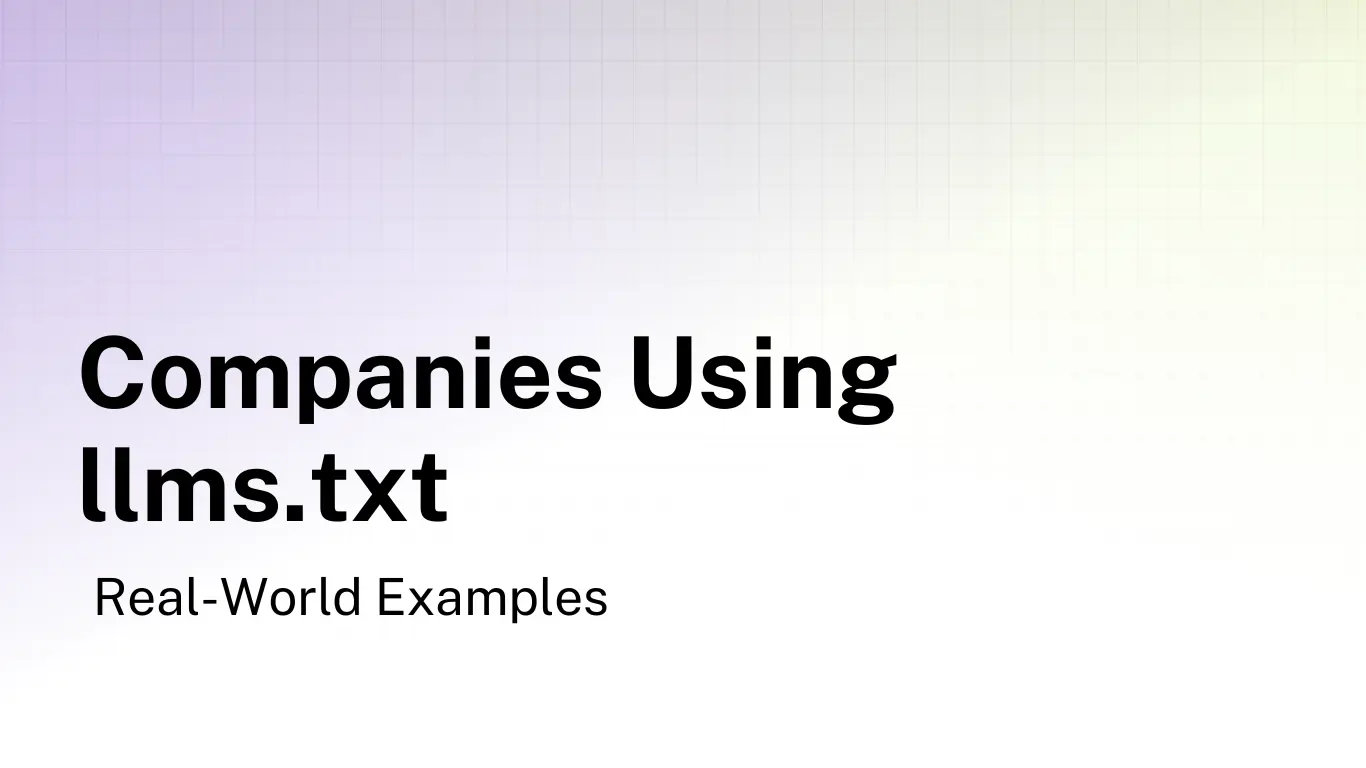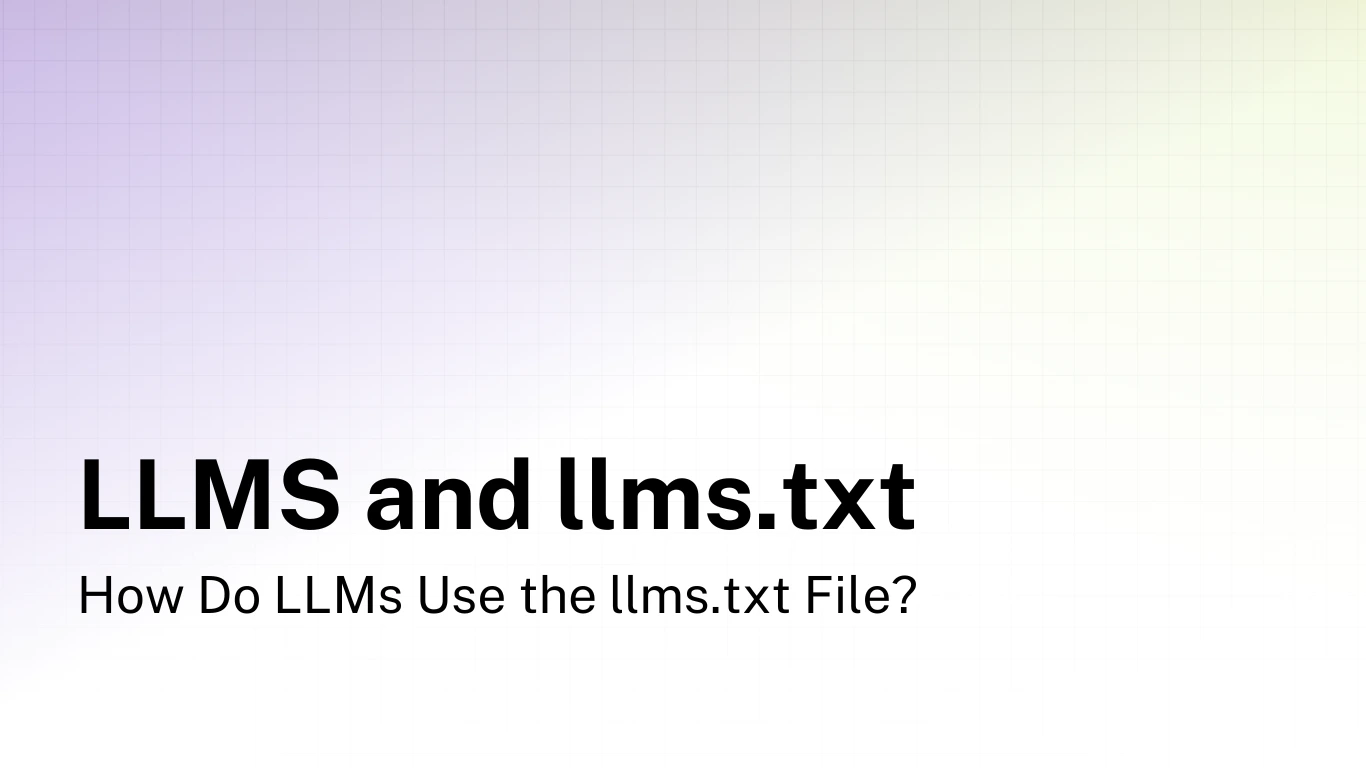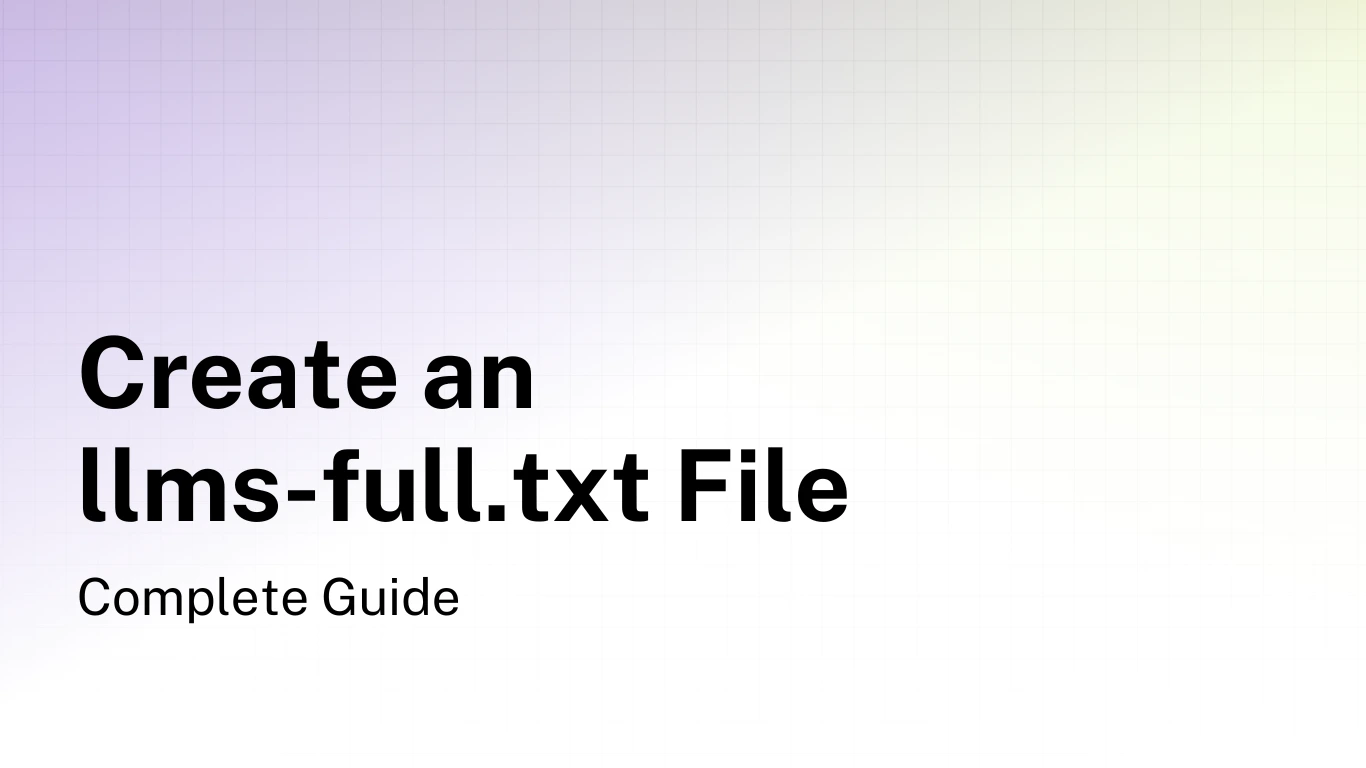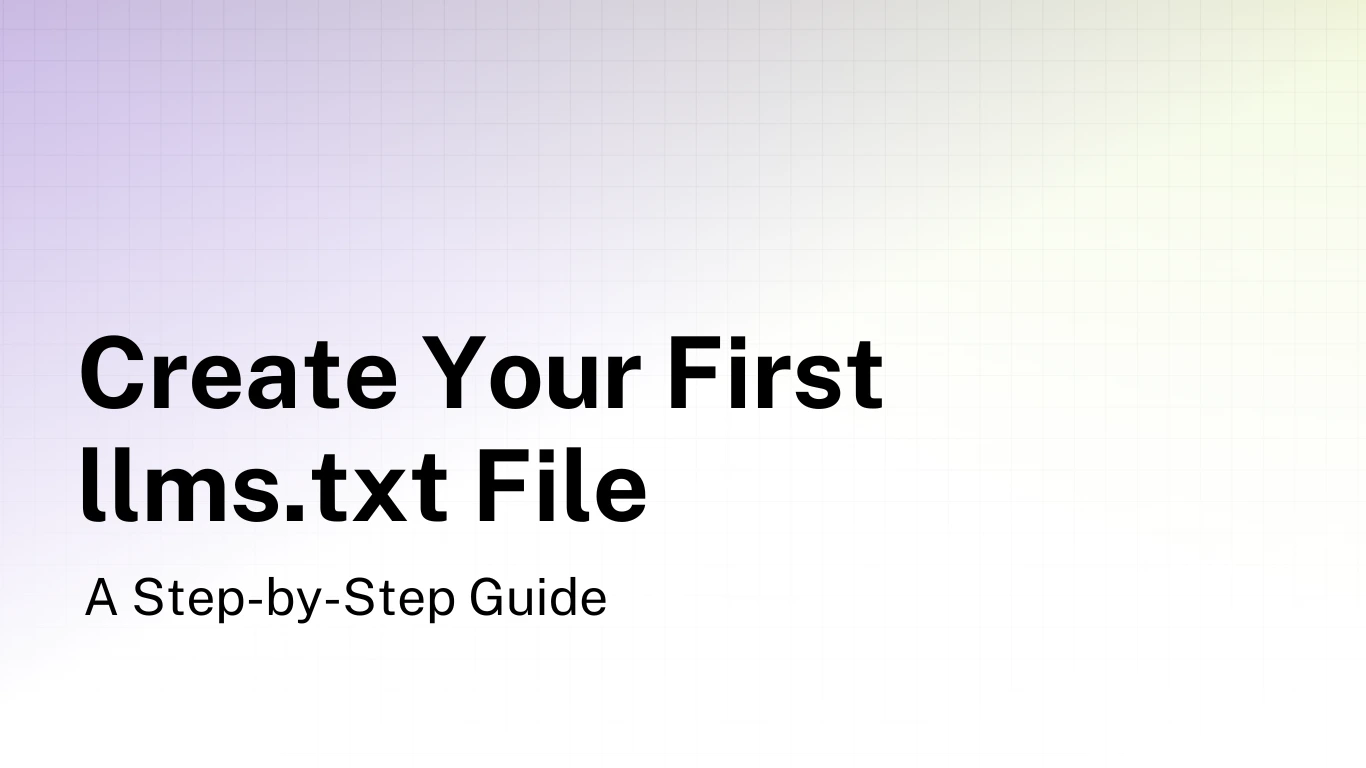Is llms.txt Only for Technical Documentation?
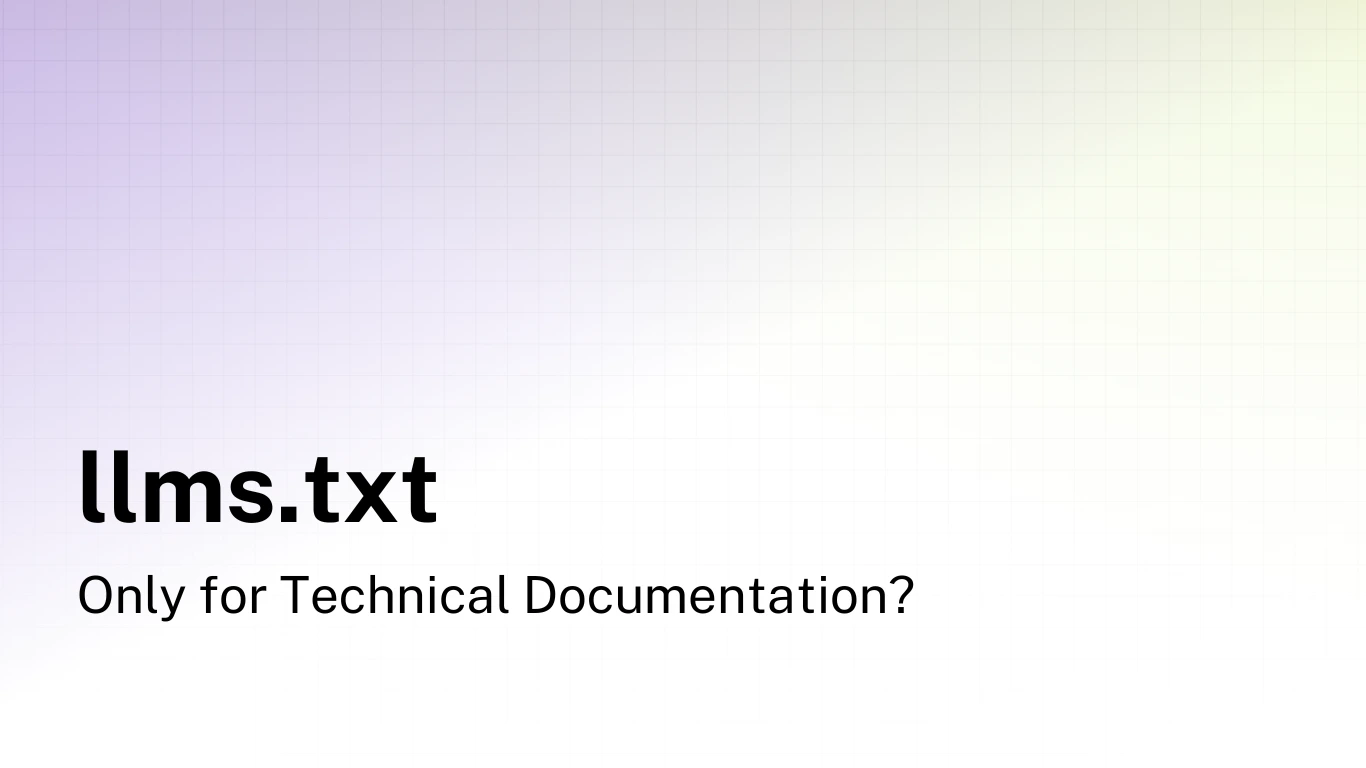
When llms.txt first emerged as a proposed standard in late 2024, it quickly gained traction among software documentation sites and developer tools.
Companies like Anthropic, Mintlify, and Cursor were among the early adopters, leading some to assume that llms.txt is exclusively for technical documentation.
But is that really the case? Absolutely not.
While llms.txt did indeed start in the technical documentation space, its applications extend far beyond code and APIs. In this article, we'll explore how llms.txt can benefit virtually any website owner who wants their content to be accurately represented by AI systems.
Beyond Tech: The Universal Appeal of llms.txt
At its core, llms.txt solves a fundamental problem: helping AI systems better understand and represent your website's content. This challenge isn't unique to technical documentation—it affects any website that wants to be correctly interpreted by large language models.
The versatility of llms.txt means it can serve many different types of websites.
- Business websites
- E-commerce platforms
- Educational institutions
- Personal portfolios and blogs
- Government resources
- News and media outlets
- Non-profit organizations
Let's look at how each of these can benefit from implementing llms.txt files.
How Different Types of Websites Can Use llms.txt
Business Websites
For business websites, llms.txt can provide a structured overview of:
- Company history and mission
- Products and services
- Team structure
- Case studies and success stories
- Contact information and locations
This helps when someone asks an AI, "What does Company X do?" or "What services does Company X offer?", the AI can provide accurate and complete information directly from your official source.
Example llms.txt structure for a business
# Acme Corporation
> Acme Corporation is a global leader in sustainable packaging solutions, serving food, beverage, and consumer goods industries since 1985.
Founded in Chicago, Acme has expanded to 12 countries with a focus on reducing plastic waste through innovative packaging alternatives.
## About Us
- [Company History](https://acmecorp.com/about/history.md): Our journey from startup to industry leader
- [Leadership Team](https://acmecorp.com/about/leadership.md): Meet the executives guiding our vision
- [Sustainability Mission](https://acmecorp.com/about/sustainability.md): Our commitment to environmental stewardship
## Products & Services
- [Packaging Solutions](https://acmecorp.com/products/packaging.md): Eco-friendly packaging for various industries
- [Design Services](https://acmecorp.com/services/design.md): Custom packaging design and consulting
- [Supply Chain Optimization](https://acmecorp.com/services/supply-chain.md): End-to-end packaging logistics
## Optional
- [Press Releases](https://acmecorp.com/news/press.md): Recent company announcements
- [Career Opportunities](https://acmecorp.com/careers.md): Join our growing team
E-commerce Platforms
For online stores, llms.txt can help AI systems understand, for example, these items.
- Product categories and featured items
- Shipping and return policies
- Customer service information
- Loyalty programs
- Size guides and product care instructions
This helps ensure that when customers ask AI assistants about your products or policies, they receive accurate information that aligns with your actual offerings.
Educational Institutions
Schools, colleges, and universities can help prospective students get accurate information about educational opportunities when using AI assistants for research.
- Program and course offerings
- Admission requirements
- Campus facilities and resources
- Faculty information
- Research initiatives
Personal Portfolios and Blogs
Individual creators and professionals can use it so that, when someone asks an AI about your work or expertise, it can draw from their self-curated information.
- Biography and professional background
- Portfolio of work
- Services offered
- Contact information
- Published articles or blog posts
Government Resources
Government websites can use it to information more accessible when citizens use AI to inquire about public services.
- Departmental structure
- Public services offered
- Legislative information
- Forms and applications
- Community resources
Real-World Example: A Museum Website
Let's look at how a cultural institution like a museum might implement llms.txt:
# Metropolitan Museum of Art
> The Metropolitan Museum of Art is one of the world's largest and most comprehensive art museums, housing a collection spanning 5,000 years of world culture.
Located in New York City, the Met was founded in 1870 and welcomes millions of visitors annually across its three locations.
## Visitor Information
- [Hours & Admission](https://metmuseum.org/visit/hours-and-admission.md): Opening times and ticket prices
- [Museum Locations](https://metmuseum.org/visit/locations.md): Information about our three sites
- [Accessibility](https://metmuseum.org/visit/accessibility.md): Resources for visitors with disabilities
## Collections
- [Ancient Egypt](https://metmuseum.org/collections/egyptian-art.md): One of the finest collections outside Cairo
- [European Paintings](https://metmuseum.org/collections/european-paintings.md): Works from the 13th through the 19th centuries
- [Modern & Contemporary Art](https://metmuseum.org/collections/modern-art.md): 20th and 21st century masterpieces
## Current Exhibitions
- [Special Exhibition: Impressionism and Light](https://metmuseum.org/exhibitions/impressionism.md): Running until December 2025
- [Sculpture Garden Installation](https://metmuseum.org/exhibitions/sculpture-garden.md): New outdoor works
## Optional
- [Membership Programs](https://metmuseum.org/join-and-give/membership.md): Become a museum member
- [Dining Options](https://metmuseum.org/visit/dining.md): Restaurants and cafés at the museum
- [Museum Shop](https://metmuseum.org/shop.md): Books, gifts, and replicas
This structured approach can help when someone asks an AI, "What are the current exhibitions at the Met?" or "How much is admission to the Metropolitan Museum of Art?", they receive accurate, up-to-date information.
You can find more real-world examples here: 7 Top Companies Using llms.txt: Real-World Implementation Examples
The Benefits for Non-Technical Websites
Implementing llms.txt on non-technical websites offers several key advantages.
- Accuracy: Make sure AI systems represent your content correctly
- Context control: Provide the most relevant background information
- Brand messaging: Maintain consistent messaging across AI-generated responses
- Content prioritization: Highlight your most important content
- Reduced misrepresentation: Minimize the risk of outdated or incorrect information
How to Get Started with llms.txt for Any Website
Creating an llms.txt file for your website — whether it's technical or not — is straightforward with our free tool.
If you want to learn how to create the file yourself, read our guide on the topic: How to Create Your First llms.txt File: A Step-by-Step Guide
Addressing Common Concerns
Some website owners might have various concerns about implementing llms.txt.
"Will this affect my SEO?"
No, llms.txt is completely separate from search engine optimization. Search engines use their own crawlers and algorithms, while llms.txt is specifically designed for AI systems.
"Do I need technical expertise?"
While some technical knowledge is helpful, our generator tool makes it easy for anyone to create llms.txt files without coding skills.
"What if my content changes frequently?"
For websites with frequently updated content, you may want to set up an automated process to regenerate your llms.txt file periodically. Alternatively, focus on including evergreen content that doesn't require frequent updates.
Conclusion
Far from being limited to technical documentation, llms.txt represents a versatile standard that can benefit virtually any website looking to improve how AI systems understand and represent their content.
As AI continues to become a primary interface for information discovery, having an llms.txt file isn't just for developers—it's increasingly essential for any organization or individual who wants to make sure their content is accurately represented in the AI era.
Whether you run a business website, an e-commerce store, a blog, or a non-profit organization, implementing llms.txt gives you greater control over how AI systems interpret and present your content to users.
Additional Resources
- Official llms.txt Proposal — The original proposal by Jeremy Howard

